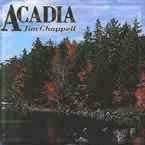![]()
![]()
The Making of "Acadia", a Conversation with Jim Chappell, by Dan Liss
 Jim
Chappell's enchanting, elegant new album of acoustic music, Acadia,
is dedicated to the U.S.' second most visited national park, which is
located in Maine. The liner notes detail the flora, fauna and
topography of the park, giving the listener an armchair tour as well
as a sonic experience. Recently he talked about why he chose this
theme, then offered some other interesting insights into his
music.
Jim
Chappell's enchanting, elegant new album of acoustic music, Acadia,
is dedicated to the U.S.' second most visited national park, which is
located in Maine. The liner notes detail the flora, fauna and
topography of the park, giving the listener an armchair tour as well
as a sonic experience. Recently he talked about why he chose this
theme, then offered some other interesting insights into his
music.
"My brother Gary gave me the idea. He said I'd like the like the type
of woodland and water, fall colors, the hiking and camping. It
reminded him of where we grew up, in Michigan. He was right.
"I took a hand-held tape recorder, and just let the music come to me. Then when I got home, I could compose and arrange themes based on those tapes. On 'The Carriage Road,' for example, I tried to capture that sound of walking along crunching though leaves. I wanted to have that rhythm and feel.
"The instrumentation on here was different for me. In the past I've done solo piano, which is what I'll probably go back to, and other types of ensembles, but this was one of the largest. I wanted more natural instruments to reflect the natural feel and beauty of the park: the natural wood of the cello, violins, acoustic guitar; the breathing into the wind instruments, the percussion, the piano, all describing the setting in most natural way.
"The most unusual experience I had was up on Beech Mountain. It was getting near sunset, and I got disoriented and went down the wrong side. An older couple was camped down there, and they gave me a lift back. That was specialbecause people who really appreciate nature have a certain honor and respect for life. People you meet on the trail are usually considerate and helpful. Here these people went out of their way to help me and they didn't know me.
"Another unusual instance was when this guy was shopping in a nature store that was selling my album. He heard 'Jordan Pond' and remarked to the owner that the sound reminded him of this beautiful place where he and his wife went camping, by this exact spot. You can imagine his reaction when the store owner showed him the album.
"One of the most special cuts on the album is 'Leaving.' I felt melancholoy because my weeklong trip was over, and until that moment, I thought I had recorded all my music. Then this other melody just came to me.
"I feel that the national parks are really special. If we lost them, something huge and magical would be lost; people need that connection. That's why I'm donating part of all the proceeds to Friends of Acadia, a group that helps look after the park.
"For a while I played in nightclubs, but a turning point came when a woman who teaches dance and uses piano players, said I could just play the right mood, I could do original music. I was forced to make up music on spot, for four or five hours a day, the interplay was wonderful; sometimes I still do it once in a while just for fun. I did that for several years and worked with choreographers. One day I made recording, took tapes around to gift shops, in 1985, and began selling them that way. This is my eleventh album.
"Gallery Records, the label I'm on now, is my brother's company. He loves music, and he's good at marketing and distribution.
"The outdoors really helped form my character. When I was about six or seven, I used to go into the woods alone, by a pond with fish, frogs, ducks, a stream that went over to lake. When it was thawing, I spent hours just watching. It was a peaceful place where I could be myself. People hear a waterlike quality in my music, and I think that's why. Others more earthy, airy, or fiery. Every composer has more of one element in them than the others.
"I tried to make the music clear, relaxing, interesting, and passionate all rolled into one; I try and tell a story with each one, it can take you somewhere with or without words; it's uplifting, yet grounded."
by Dan Liss